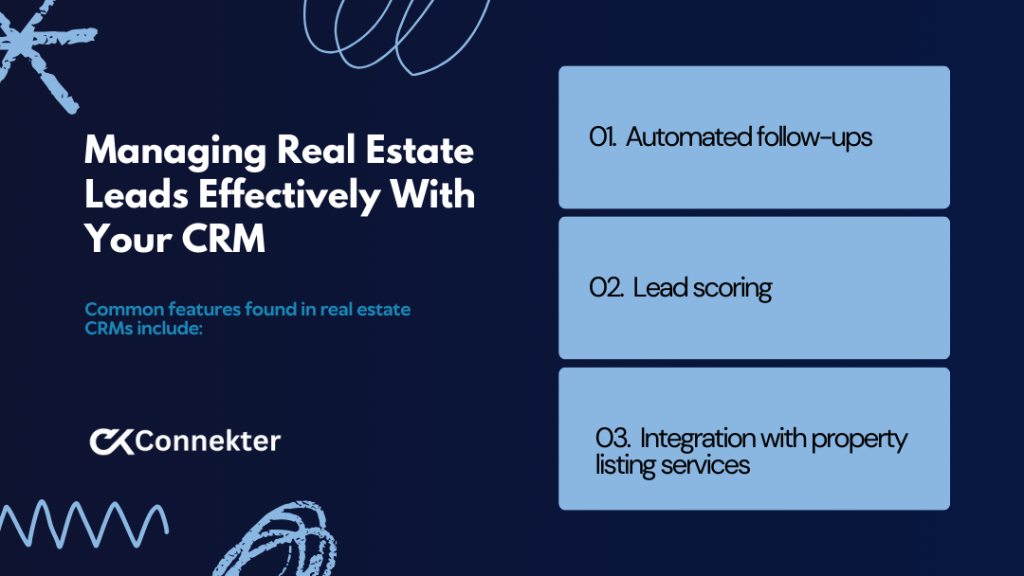
What is the essential role CRMs play in transforming leads?
Did you know that in real estate, making the most of your CRM can boost your business by up to 50%?
Of course, this will largely depend on the knowledge you acquire, the CRM you choose, and how well it adapts to your business needs.
Converting leads into loyal customers is critical. That’s why a solid customer relationship management (CRM) system can make all the difference.
What is the essential role CRMs play in transforming leads? If you’d like to explore these insights, read on.
The Importance of Lead Management
Lead management is the backbone of any successful operation. Sales cycle is unique and often lengthy. It involves several stages from the initial inquiry to closing a deal.
It includes challenges such as: keeping track of numerous leads, following up quickly, and maintaining personalized communication
These tasks can become overwhelming without an efficient system in place. Traditional manual methods may suffice for a few leads.
But the truth is that they quickly become overwhelming as opportunities increase. In this case, a CRM system proves invaluable by automating and streamlining the entire process.
CRMs have revolutionized the industry. Most notably by providing a centralized platform to capture, nurture, and convert leads. Unlike generic tools, CRMs are designed to address specific challenges faced by teams.
These systems offer functionalities that improve efficiency. In this way, they allow agents to focus more on building relationships and less on tedious administrative tasks.
Capturing Leads with Your CRM
CRMs are equipped with features that specifically cater to the needs of real estate professionals. These include tools for managing property listings, scheduling property viewings, and tracking interactions between buyers and sellers.
CRMs facilitate seamless communication and collaboration within teams. This ensures that everyone is aligned and informed.
These capabilities enable agents to efficiently capture leads, nurture them with relevant content, and ultimately convert them into clients. Additionally, real estate CRMs often provide insights into the behavior of leads. In this way, they help teams prioritize the most promising prospects.
Effectively capturing leads is the first step toward successful real estate transactions. A CRM can aggregate leads from various sources, such as websites. Also, social media and property portals.
Integration into the lead generation strategy
This centralization ensures no opportunity is missed, making integration into the lead generation strategy seamless. And all leads are funneled into a single, manageable platform. Automated lead capture tools play a vital role in this process. By reducing manual entry errors and ensuring timely responses to inquiries.
Utilizing a CRM’s lead capture capabilities allows real estate teams to expand their reach. And gather valuable data from multiple channels.
This data can then be analyzed to understand lead demographics. Also, preferences and behavior, offering insights that inform marketing strategies and improve targeting.
Let’s take Connekter as a model lead generation platform. This is because it is a platform with great integration possibilities.
Connekter easily integrates with almost all CRMs, especially if they use Zapier. But it also integrates with other platforms and websites. Building alliances with social networks, sites and landing pages.
This digital framework makes it possible to achieve a greater reach. The more people see you, the greater the sales opportunities.
At Connekter, information is centralized and accessible from one place. This, combined with working with pre-qualified clients, saves time and resources considerably. Now, how to build a CRM strategy?
Organizing and Segmenting
Organizing and segmenting leads are crucial for delivering personalized experiences to potential clients. CRMs enable real estate professionals to categorize leads based on various criteria, such as interest level, location, and property type.
Utilizing tags, labels and filters, agents can create a structured approach to lead management. Ensuring each lead receives the appropriate attention. The same way Connekter works.
Segmentation is essential for personalized follow-ups and targeted marketing efforts. By understanding the specific needs and interests of each lead, agents can tailor their communications.
Resulting in higher engagement and conversion rates. A well-segmented CRM database allows real estate teams. This, to prioritize leads effectively and allocate resources where they are most needed.
Nurturing Leads to Build Relationships
Building strong relationships with potential clients is at the heart of successful lead management. Automated follow-ups through a CRM ensure that no lead is left unattended, maintaining consistent communication throughout the sales process.
Personalized messages crafted with CRM automation can significantly enhance engagement. Demonstrating genuine interest and understanding of the client’s needs.
Timing interactions is critical in staying top-of-mind with leads. A CRM can help schedule timely follow-ups based on lead behavior and engagement. Ensuring agents are reaching out when the lead is most receptive.
This proactive approach fosters trust and confidence. Ultimately increasing the likelihood of converting leads into clients.
Connekter provides real estate agents with emails, phones and other forms of communication. In this way, the leads reach the client directly. And are grouped in a personal database so that they can consult it in their control panel.

Tracking Lead Progress and Engagement
Monitoring lead progress and engagement is vital for understanding where each lead stands in the sales process. A CRM provides comprehensive tracking capabilities. Allowing agents to record every interaction and engagement.
This data-driven approach enables real estate teams to determine when to escalate a lead. Ensuring timely intervention when a prospect shows buying intent.
Identifying hot, warm and cold leads through CRM insights allows agents to prioritize their efforts effectively. By focusing on leads with the highest potential, real estate teams can maximize their conversion rates and achieve better outcomes.
Converting Leads into Clients
The ultimate goal of lead management is to convert leads into clients. Knowing when a lead is ready to move forward is crucial for closing deals. A CRM can support this process by providing insights into lead readiness and facilitating contract negotiations and transaction management.
Consistent follow-up and timely communication are key factors in finalizing deals. Ensuring leads are guided smoothly through the sales funnel.
With the right CRM in place, real estate teams can confidently manage the transition from lead to client. Ensuring a seamless experience for both parties. This strategic approach enhances client satisfaction and fosters long-term relationships.
Do you want to explore other ways to convert leads into loyal customers? Join Connekter today and find out how we do it!
Extra resources:
- CRM for Real Estate vs. Generic CRM: What’s the Difference? Read more…
- The Ultimate Guide To Real Estate CRM Lead Management. Learn more…
- Boost Sales with CRM Automation! Real Estate Strategies. See more…
- Real Estate: Using CRM in Marketing Campaigns with Connekter. Read more…
- Future Trends in Lead Management Automation: Connekter Features. Read more…

